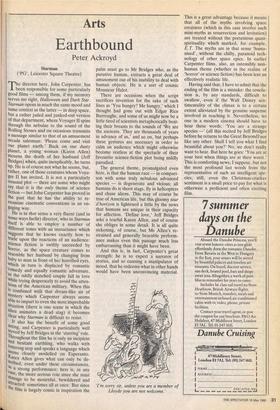Arts
Earthbound
Peter Ackroyd
Starman ('PG', Leicester Square Theatre)
The director here, John Carpenter, has been responsible for some particularly good films — among them, if my memory serves me right, Halloween and Dark Star. Starman opens in much the same mood and same context as the latter — in deep space, but a rather jaded and junked-out version of that department, where Voyager II spins through the nebulae to the sound of the Rolling Stones and on occasions transmits a message similar to that of an amusement arcade salesman: 'Please come and visit our planet earth.' Back on our dusty planet, a young woman (Karen Allen) mourns the death of her husband (Jeff Bridges) when, quite inexplicably, he turns op. He is of course not what he seems, but, rather, one of those creatures whom Voya- ger II has invited. It is not a particularly unusual plot — there are some who might say that it is the only theme of science fiction — but John Carpenter has proved in the past that he has the ability to re- examine cinematic conventions in an en- gaging way.
He is in that sense a very fluent (and in some ways facile) director, who in Starman Itself is able to employ a number of different tones with an insouciance which suggests that he knows exactly how to trade upon the reactions of an audience: science fiction is swiftly succeeded by horror, as the space creature comes to resemble her husband by changing from baby to man in front of her horrified eyes, Which in turn is displaced by romantic comedy and equally romantic adventure, as the oddly matched couple fall in love While trying desperately to avoid the atten- tions of the American military. When this Is combined with that dream-like air of Mystery which Carpenter always seems able to impart to even the most improbable situation (there is one scene in which the alien animates a dead stag) it becomes clear why Starman is difficult to resist. It also has the benefit of some good acting, and Carpenter is particularly well Served by Jeff Bridges in the 'starring' role. 'throughout the film he is only an incipient and hesitant earthling, who walks with tottering step and speaks a language which teems closely modelled on Esperanto. Karen Allen gives what can only be de- scribed, even under these circumstances, as a strong performance; hers is, in any case, the more serious role since she must Manage to be mournful, bewildered and attracted: sometimes all at once. But since the film is largely comic in inspiration the
palm must go to Mr Bridges who, as the putative human, extracts a great deal of amusement out of his inability to deal with human objects. He is a sort of cosmic Monsieur Hulot.
There are occasions when the script sacrifices invention for the sake of such lines as 'You hungry? Me hungry,' which I thought had gone out with Edgar Rice Burroughs, and some of us might now be a little tired of scientists metaphorically beat- ing their breasts to the sounds of 'We are the ancients. They are thousands of years in advance of us,' and so on, but perhaps these gestures are necessary in order to calm an audience which might otherwise become restless at the spectacle of their favourite science-fiction plot being mildly parodied.
The general theme, promulgated even here, is that the human race — in compari- son with some truly nebulous advanced species — is degenerate and vicious; all humans do is shoot stags, fly in helicopters and chase aliens. This may of course be true of American life, but this gloomy tour d'horizon is lightened a little by the news that humans are unique in their capacity for affection. 'Define love,' Jeff Bridges asks a tearful Karen Allen, and of course she obliges in some detail. It is all quite sickening, of course, but Ms Allen's re- strained and generally bearable perform- ance makes even this passage much less embarrassing than it might have been.
And this is, in fact, Carpenter's great strength: he is so expert a narrator of stories, and so cunning a manipulator of mood, that he redeems what in other hands would have been unconvincing material.
'I'm sorry sir, unless you are a member of Lloyds you are not welcome.'
This is a great advantage because it means that all of the myths involving space creatures (which in this case involve such mini-myths as resurrection and levitation) are treated without the portentous quasi- spirituality which marked, for example, E. T. The myths are in that sense 'huma- nised', without the chilly, paranoid tech- nology of other space epics. In earlier Carpenter films, also, an ostensibly non- human theme (whether in the realms of 'horror' or science fiction) has been lent an effectively realistic life.
Having said that, I have to admit that the ending of the film is a mistake: the conclu- sion is, by any standards, difficult to swallow, even if the Walt Disney sen- timentality of the climax is to a certain extent alleviated by the genuine suspense involved in reaching it. Nevertheless, no one in a modern cinema should have to hear these words: 'You arc a strange species —' (all this recited by Jeff Bridges before he returns to the Great Beyond)'not like any other. Shall I tell you what I find beautiful about you?' No, we don't really want to hear. But here he goes: 'You are at your best when things are at their worst.'
This is comforting news, I suppose, but not the most profound last words from the representative of such an intelligent spe- cies; still, even the Christmas-cracker sentiment is a small price to pay for what is otherwise a proficient and often exciting film.














































 Previous page
Previous page